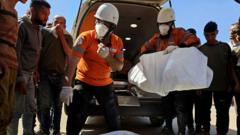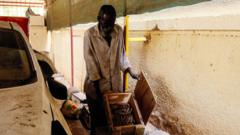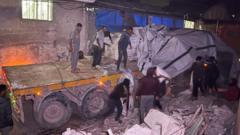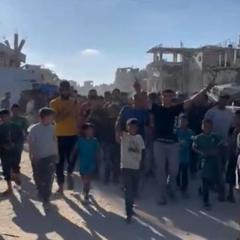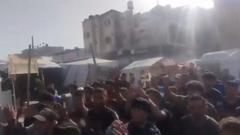As food aid trickles into Gaza following a partial blockade lift, chaos reigns as desperate residents grapple with severe hunger and insecurity, underscoring the deep humanitarian crisis.
Desperation Fuels Chaos in Gaza as Food Supplies Dwindle

Desperation Fuels Chaos in Gaza as Food Supplies Dwindle
Amid ongoing conflict, Gazans face acute food shortages and violence from looters
In the heart of Gaza, desperation manifests as crowds swarm bakeries while armed assaults target food convoys, resulting in conflict between Hamas security and unidentified gunmen. In this bleak atmosphere, a partial lifting of the Israeli blockade allowed some food aid into Gaza. However, the limited supply has only aggravated the chaos, as bakeries were overwhelmed and shut their doors due to security concerns.
A convoy loaded with essential flour from the World Food Programme (WFP) fell victim to looters, prompting a firefight with Hamas security that escalated into an Israeli drone attack, claiming the lives of six officers. In response, the Israeli Defense Forces (IDF) stated its actions were aimed at preventing aid from reaching Hamas, while Hamas condemned the drone strike as a grievous attack on those safeguarding humanitarian efforts.
Despite the arrival of approximately 130 aid trucks in recent days, humanitarian organizations indicate this is far short of the 500 to 600 trucks needed daily for the 2.1 million residents in Gaza. Long-standing concerns over the distribution of aid have led to local calls for changes, suggesting flour distribution directly to households might better meet the needs of families.
As the humanitarian crisis deepens, residents continue to report severe shortages of electricity, food, and clean water. Reports from within Gaza highlight the staggering increase in malnutrition, particularly among mothers and children, as medical services remain critically strained. The UN has asserted that the overall state of aid entering Gaza remains woefully inadequate with ongoing violence complicating access and safety for aid workers.
Local accounts describe a landscape filled with fear and uncertainty as families choose to remain in damaged homes despite evacuation orders, with many now living in public spaces without basic amenities. Critically, humanitarian workers underscore the urgency of improved aid delivery within a context where even minimal assistance feels like a drop in the ocean against a tsunami of need.
As Israel continues military operations and maintains its blockade rationale to pressure Hamas, humanitarian leaders urgently call for more effective strategies to ensure that food and necessary supplies can reach the millions in dire circumstances.
A convoy loaded with essential flour from the World Food Programme (WFP) fell victim to looters, prompting a firefight with Hamas security that escalated into an Israeli drone attack, claiming the lives of six officers. In response, the Israeli Defense Forces (IDF) stated its actions were aimed at preventing aid from reaching Hamas, while Hamas condemned the drone strike as a grievous attack on those safeguarding humanitarian efforts.
Despite the arrival of approximately 130 aid trucks in recent days, humanitarian organizations indicate this is far short of the 500 to 600 trucks needed daily for the 2.1 million residents in Gaza. Long-standing concerns over the distribution of aid have led to local calls for changes, suggesting flour distribution directly to households might better meet the needs of families.
As the humanitarian crisis deepens, residents continue to report severe shortages of electricity, food, and clean water. Reports from within Gaza highlight the staggering increase in malnutrition, particularly among mothers and children, as medical services remain critically strained. The UN has asserted that the overall state of aid entering Gaza remains woefully inadequate with ongoing violence complicating access and safety for aid workers.
Local accounts describe a landscape filled with fear and uncertainty as families choose to remain in damaged homes despite evacuation orders, with many now living in public spaces without basic amenities. Critically, humanitarian workers underscore the urgency of improved aid delivery within a context where even minimal assistance feels like a drop in the ocean against a tsunami of need.
As Israel continues military operations and maintains its blockade rationale to pressure Hamas, humanitarian leaders urgently call for more effective strategies to ensure that food and necessary supplies can reach the millions in dire circumstances.



